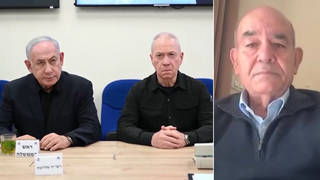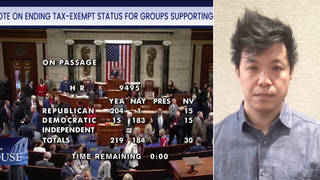HeadlinesJuly 11, 2013
Bradley Manning Defense Rests with Challenge to “Aiding the Enemy” Claims
Defense attorneys for Army whistleblower Bradley Manning have rested their case after calling three witnesses over 10 days. The defense’s final witness, Harvard Law Professor Yochai Benkler, warned that finding Manning guilty of “aiding the enemy” for handing material to WikiLeaks could lead to similar charges against any media outlet publishing online. Manning attorney David Coombs also revealed in court a key counterpoint to U.S. claims that Manning’s leak helped al-Qaeda and Osama bin Laden. According to Coombs, previously undisclosed testimony shows bin Laden asked his aides to see the leaked WikiLeaks material only after he saw the U.S. government openly describing WikiLeaks as a group helpful to U.S. foes. Coombs said: “[The] rhetoric is what drives the enemy to actually go look at WikiLeaks, not the actual publication of the information.” Manning never took the stand to testify in his own defense but did give a lengthy statement at his pretrial hearing earlier this year. The trial continues next week with arguments over defense motions to have seven of Manning’s 22 counts dismissed.
U.S. Taps into Global Internet Cables Through Foreign Deals
Details continue to emerge on U.S. surveillance of the global Internet. The Washington Post reports the National Security Agency’s PRISM program mining the servers of major Internet companies like Google and Facebook has run in parallel with a separate operation called “Upstream.” Through Upstream, the NSA taps directly into the fiber-optic cables that carry the vast majority of global Internet traffic. The United States has ensured access by sending a group of federal officials dubbed “Team Telecom” to reach agreements with global telecom providers. A 2003 agreement with the Asia-based Global Crossing imposed “an internal corporate cell” of Americans to make sure surveillance requests were approved. Global Crossing was also forced to establish a U.S.-based “Network Operations Center” where U.S. agents could show up with just 30 minutes’ notice. The United States has used the Federal Communications Commission as leverage to hold up the approval of cable licenses sought by foreign firms.
NSA Writes Code Used in Google Phone
The tech giant Google has confirmed the National Security Agency furnished some of the code installed in its new Android phone. The NSA says the code is intended to enhance security against hackers and marketers, but will not confirm whether it also aids the agency’s PRISM program monitoring the global Internet.
Retired FISA Judge Calls for Court’s Reform
A retired federal judge who served on the Foreign Intelligence Surveillance Court that approves government surveillance is calling for reform of the court’s duties. The FISA court has come under increased scrutiny in the aftermath of Edward Snowden’s disclosures for essentially crafting a secret, separate body of law that abets wholesale spying. The New York Times reported over the weekend the FISA court has become a “parallel Supreme Court,” issuing over a dozen classified rulings that allow the government to seize mass phone records and Internet data. The Wall Street Journal reports that in a series of orders dating back to the mid 2000s, the FISA court, or FISC, endorsed an expansion of the word “relevant” to mean “an entire database of records on millions of people.” On Tuesday, a former member of the FISA court broke ranks to say the secretive judicial body should be stopped from settling matters of policy. Speaking at a public hearing, former D.C. Circuit Judge James Robertson said: “Anyone who has been a judge will tell you a judge needs to hear both sides of a case. … This process needs an adversary.”
U.S. Continues Military Aid to Egypt as Admin Weighs Coup Designation
The Obama administration is proceeding with military aid to Egypt one week after the ouster of President Mohamed Morsi. Reuters reports the United States will send four F-16 fighter jets to Egypt next month as part of an annual aid package. Eight more F-16s are due later in the year. At the White House, Press Secretary Jay Carney said the United States is still evaluating whether to brand Morsi’s removal as a coup, which would require the suspension of military aid.
White House Press Secretary Jay Carney: “We are evaluating how the authorities are responding to and handling the current situation. We will take our time and the time necessary to make the determinations regarding what happened last week and the change in leadership, the removal of President Morsi from power.”
Muslim Brotherhood Calls For Friday Protest
Egypt’s Muslim Brotherhood has called on supporters to hold a major rally on Friday. Egyptian prosecutors have issued arrest warrants for top Brotherhood leaders on charges of inciting violence. Despite the standoff, Egypt’s interim government says it still hopes to include Brotherhood officials in the country’s new Cabinet.
Report: U.S. Aided Morsi Opponents Before Ouster
Al Jazeera is reporting the U.S. government helped fund Mohamed Morsi’s opponents in the period before his ouster. According to the Investigative Reporting Program at University of California at Berkeley, a State Department initiative to promote Middle East democracy gave money to a number of opposition activists and politicians, many of whom backed Morsi’s overthrow.
Cyberhacking Looms Large at U.S.-China Summit
The United States and China are holding high-level talks in Washington for a second day. On Wednesday, Vice President Joe Biden launched the summit with a call for mutual cooperation.
Vice President Joe Biden: “The stakes are very high, because it’s fair to say that the dynamic that emerges between our nations will affect not just our peoples, but, quite frankly, have a significant impact on the entire world.”
The summit continues to see a clash over the issue of cyberhacking by both sides. The United States is asking China to end cyberpiracy of U.S. intellectual property, while China has pointed to the U.S. hacking of Chinese networks revealed by Edward Snowden.
Boston Marathon Suspect Pleads Not Guilty in 1st Court Appearance
The surviving suspect in the Boston Marathon bombing, Dzhokhar Tsarnaev, has pleaded not guilty on 30 counts, including the murders of four people. In his first public appearance since the violent standoff after the bombing, Tsarnaev faced a courtroom packed with survivors and victims’ relatives. After the hearing, some of those who came said it was difficult to see Tsarnaev in person.
Mildred Valverde: “Just his presence being there after all the destruction he caused and all the hurt he caused everyone, just to be in the same room with him was bothersome. I’m heading home now.”
Liz Norden: “I don’t know. I actually felt sick to my stomach. It’s very emotional for me. So, you know, I actually felt — I’m angry, but I actually feel really — I don’t know. I feel sorry for everybody.”
Tsarnaev could face the death penalty if convicted.
Texas House Approves Anti-Abortion Bill; Several Protesters Arrested
The Texas state House has given final approval to a bill that would ban abortion at 20 weeks post-fertilization, hinder access to the pill form of abortion and shut down nearly all of the state’s abortion clinics. The bill was blocked last month by a people’s filibuster after State Senator Wendy Davis stood and spoke for nearly 11 hours. But Gov. Rick Perry revived it by calling a second special legislative session. The bill now heads back to the Texas state Senate. During the House vote Wednesday, several pro-choice people rose to their feet to voice opposition to the proceedings. State troopers moved in. Five women were reportedly arrested. One of the most vocal opponents of the Texas anti-choice bill this week was Houston resident Sarah Slamen. Video of her testimony before a Texas state Senate committee on Monday went viral after she was interrupted by the committee chair, Republican State Senator Jane Nelson, and then hauled from the chamber by state troopers.
Sarah Slamen: “Thank you for being you, Texas Legislature. You have radicalized hundreds of thousands of us, and no matter what you do for the next 22 days, women and their allies are coming for you. Let’s start down the line. Senator Campbell, you’re an ophthalmologist, so I won’t be making you the expert on reproductive health. We can give you all the children with chlamydia and herpes in their eyes, since we don’t have sex ed in the state. And Senator Hegar? You’re about as helpful [gavel comes down] — You are about as [interrupted] — Excuse me! This is my government, ma’am. I will judge you! And I will speak against an ophthalmologist who says — everyone on the Internet can see what you’re doing right now. This is a farce. The Texas Legislature is a bunch of liars who hate women. These men are paid by all of you to be here, a million dollars during a special session. They think [inaudible] so that they can tell us what to do with the inside of our bodies.”
North Carolina GOP Inserts Abortion Curbs in Motorcycle Safety Bill
In North Carolina, state House Republicans have rushed to quietly advance anti-choice restrictions by attaching them to a bill on motorcycle safety. Some members of a North Carolina state House committee were surprised by the move. State Rep. Sam Queen tweeted Wednesday: “New abortion bill being heard in the committee I am on. The public didn’t know. I didn’t even know.” The bill imposes a series of restrictions critics say are aimed at shutting down clinics. The provisions are similar to those passed by the North Carolina state Senate last week without a public hearing as part of a bill ostensibly designed to bar sharia law in the state. Republican Governor Pat McCrory had voiced concern about the way that bill was forced through without the typical procedures in what some pro-choice critics have deemed a “sneak attack.”
Democratic Split Thwarts Bill to Reduce Student Loan Rates
A split among Democrats has blocked an effort to reverse the doubling of interest rates on federally subsidized student loans. The interest rate for Stafford loans doubled to 6.8 percent earlier this month after Congress failed to reach a deal to avoid the hike. On Wednesday, a bipartisan group of senators blocked a Democratic proposal to return the rate to 3.4 percent retroactively. Several Democrats joined a Republican filibuster after Democratic leaders rejected their proposal to link the student loan rate to market rates and the costs of federal debt. Lawmakers can still reverse the interest hike if they act before most loans are issued next month.
California Seeks to Evade Overcrowding Order as Hunger Strike Continues
California has asked the Supreme Court to release it from an order to reduce its prison population by about 10,000 prisoners this year. A federal panel recently reaffirmed previous decisions ordering the California prison system to reduce overcrowding due to inhumane conditions. According to court documents, at least one California prisoner “needlessly dies every six or seven days due to constitutional deficiencies.” California has had a prisoner suicide rate that at times has been 80 percent higher than the national average. But in their filing, California officials sought permission to ignore the overcrowding order, citing what it said are improved conditions. The request comes just as nearly 29,000 California prisoners have launched a hunger strike against prison conditions and rules. The strike is now in its third today and could become the state’s largest ever.
Labor Rights Groups Reject U.S. Retailers’ Safety Plan for Bangladeshi Factories
A group of major North American retail giants have unveiled their own version of a safety plan for garment factories in Bangladesh. The proposal calls for $42 million in spending on worker safety, $100 million in available loans, and factory inspections within 12 months. But unlike a safety plan adopted by mostly European retailers, the new commitments are not legally binding. Major U.S. companies including Wal-Mart, Gap and Target advanced their version after refusing to endorse the European agreement. Both measures followed the factory collapse that killed more than 1,100 garment workers in April and a fire that killed 112 last November. In addition to shunning binding standards, the U.S. version also calls for “shared accountability” in paying for the required safety improvements. The European plan puts the onus for safety funding on the retailers themselves. In a statement, five labor rights groups, including the Worker Rights Consortium and United Students Against Sweatshops, criticized the U.S. retailers, saying: “Wal-Mart, Gap and companies like them simply do not want to make any promises they actually have to keep. … Under [their] scheme, brands and retailers are not obligated to pay one cent toward the renovation and repair of their factories in Bangladesh.”
D.C. Council Approves Living Wage Bill; Walmart Threatens Store Closures
The city council in Washington, D.C., has approved a measure that would force large retailers to pay workers a living wage of at least $12.50 an hour. The vote came in defiance of a threat from the world’s largest retailer, Wal-Mart, which says it will cancel plans to build three new stores in the D.C. area. The living wage rule applies to so-called “big box” retailers, with stores of at least 75,000 square feet and annual revenues of at least $1 billion. The bill excludes existing businesses and stores with unionized workplaces. Mayor Vincent Gray has yet to disclose whether or not he will issue a veto. He faces heavy pressure from Wal-Mart and other major retailers. In addition to canceling plans for three stores, Wal-Mart has said it will consider scrapping another three already under construction.
Judge Approves Chevron Subpoena of Private Internet Info
A federal judge has approved a request by the oil giant Chevron to subpoena the personal Internet information of more than 100 people, including environmental activists, journalists and lawyers. Chevron is seeking the records as part of its effort to bring a conspiracy case against the plaintiffs, who have won an $18 billion judgment against the company for polluting Ecuador’s rain forest. None of the individuals are parties to the lawsuit against Chevron, but Chevron says they may be directly or indirectly involved. Chevron is seeking the IP addresses that show the time and location of every single login over a nine-year period.
Gov. McDonnell Accepted $120,000 from Controversial Donor
Republican Gov. Robert McDonnell of Virginia is facing new scrutiny over newly revealed funding from a prominent donor. The Washington Post reports McDonnell and his family received an additional $120,000 from Star Scientific CEO Johnnie Williams. The money came in the form of a $70,000 transfer to a corporation owned by McDonnell and his sister, and a separate $50,000 check to McDonnell’s wife. McDonnell says the money was intended as a loan. He is already under investigation for accepting more than $20,000 in gifts from Williams in exchange for promoting his company’s dietary supplement as an option for Medicare recipients.
Toll in Canada Train Disaster Hits 20, 30 Remain Missing
Police in the Canadian province of Quebec say the number of confirmed dead from a freight train disaster has risen to 20, with another 30 people still missing. The train was carrying crude oil from North Dakota when it derailed and slammed into the town center of Lac-Mégantic. On Wednesday, the head of the railroad company involved said an error by a train engineer was likely to blame.
Ed Burkhardt: “This was a failure of the brakes. It’s very questionable whether the brakes, the hand brakes, were properly applied on this train. As a matter of fact, I’ll say they weren’t, or else we wouldn’t have had this incident.”
Zimmerman Doesn’t Testify as Defense Rests in Murder Trial
Closing arguments are expected to begin today in the second-degree murder trial of George Zimmerman. On Wednesday, Zimmerman’s defense wrapped its case with Zimmerman declining to take the stand to explain his fatal shooting of Trayvon Martin, an unarmed African-American teenager. Although Zimmerman refused to testify and in turn avoided cross-examination, jurors were able to hear his side of the story in court through recordings of his statements to police as well a televised interview with Fox News conducted one year ago. Zimmerman told Fox News he had no regrets about the killing of Trayvon Martin and that it was part of “God’s plan.” Although it’s acknowledged Zimmerman followed Martin and ignored a police dispatcher’s instruction to leave him be, defense attorneys have sought to portray Martin as the aggressor.
Artist, Activist Toshi Seeger Dead at 91
The artist, filmmaker and activist Toshi Seeger has died at the age of 91. She was the wife of Pete Seeger and a key leader and artistic programmer for the Great Hudson River Revival, the annual fundraiser for the Clearwater organization that helped to clean up the Hudson River in New York. She died on Tuesday, less than two weeks short of what would have been the Seegers’ 70th wedding anniversary.
Most popular
- 1
- 2
- 3
- 4
Non-commercial news needs your support
Please do your part today.











Media Options